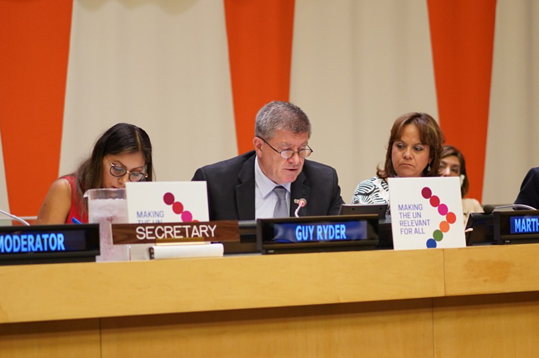
Guy Ryder, ILO Director-General
All around, I am hearing calls for change. This was the message that came through loud and clear at the recent Centenary International Labour Conference, when delegates enthusiastically adopted the ILO Centenary Declaration for the Future of Work. Now, in New York, where I am attending the 2019 High-Level Political Forum on Sustainable Development, I sense that appetite for change again.
I am here, with other international community leaders, to review in depth progress made on six of the Sustainable Development Goals, in particular SDG 8 (Promoting sustained, inclusive and sustainable economic growth, full and productive employment and decent work for all), on which the ILO leads.
The Centenary Declaration and SDG 8 have much in common. Both recognize that work is essential for development that is sustainable, leaves no one behind, and can put an end to poverty. Both call for a rights-based approach and just transition to the new economic and employment reality that is being forged by technological, demographic and climate change.
But how are we progressing towards this model of inclusive, sustained and sustainable growth? Do we have the necessary momentum? Our report on progress on SDG8 makes it clear that we are not on target for this and other SDG goals. Unless we step up our game we are going to fall short. We must move up a gear.
 I’m optimistic. The commitment is there, the recognized need is there. What is new – and in the ILO’s Centenary year this is particularly encouraging – is that we are beginning to plot out the ways to get there, the initiatives necessary to make it happen.
I’m optimistic. The commitment is there, the recognized need is there. What is new – and in the ILO’s Centenary year this is particularly encouraging – is that we are beginning to plot out the ways to get there, the initiatives necessary to make it happen.
The ILO Centenary Declaration is a vital tool for this. It is closely aligned with the 2030 Agenda’s three-dimensional approach, of social, economic and environmental sustainability.
But the Declaration takes a step further. It translates the 2030 Agenda for the world of work so that we can operationalize its growth and decent work aspects. In particular, the Declaration highlights the need to shape macroeconomic, investment, trade, industrial and sectoral policies so that they promote sustainable, inclusive growth and decent work. The Declaration also recognizes the need to align business practices with these objectives, and to respond to challenges raised by the digital transformation of work.
In short, the Centenary Declaration offers a roadmap for the transformative change we need to create for the future we want. One that puts people first. And its enthusiastic adoption in Geneva last month, by 187 ILO member States, shows that the political will for change is also there.
So, it’s going to be a big week in New York. We hear the call to action, we have the backing and the roadmap. We must now deliver.

ILO has a leading role in achieving SDG 8 (Promoting sustained, inclusive and sustainable economic growth, full and productive employment and decent work for all); however, for inclusive growth, the political commitment of the government of the respective country is a key enabler as there are large pockets of population in most developing countries who are usually left behind in any major development agenda or program. For example, rough estimates suggest that about 10% of any country’s population may have some sort of disability and in absence of a functional social support or safety system, they often live as destitute unless their families are wealthy and supportive. ILO should play an awareness building role to mainstream these vulnerable population groups and make sure that development policies and programs include their inputs and concerns. ILO must work with the local employers so that they see the value of making workplace modifications; people with certain disability will then get jobs and participate in economic activities.